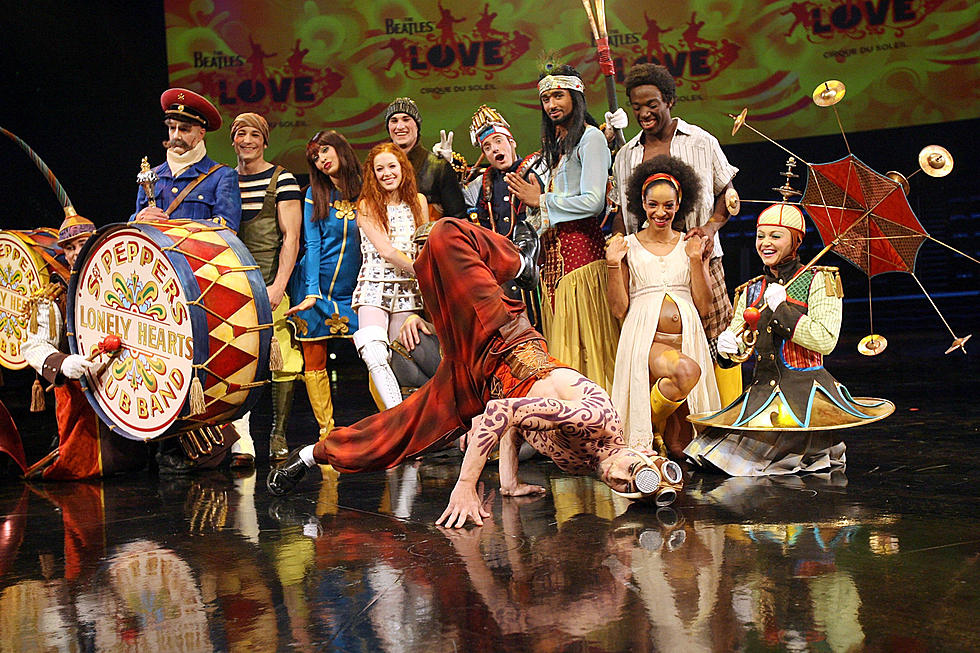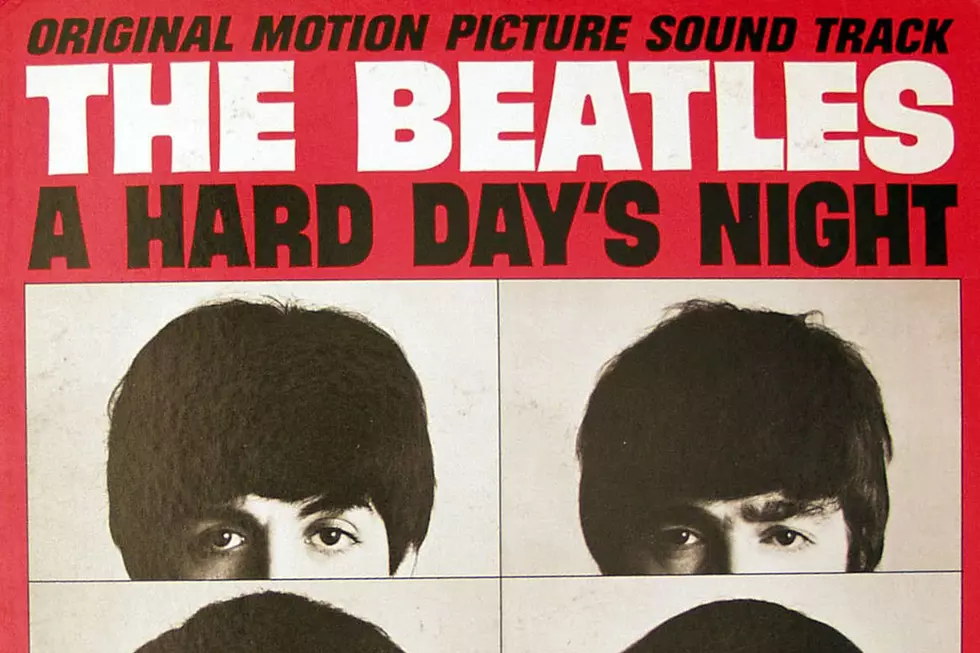
Top 10 Ringo Starr Songs Written by the Other Beatles
Warning: The below list of the Top 10 Ringo Starr Songs Written by the Other Beatles does not include his two most widely known anthems.
Put simply, 1966's "Yellow Submarine" and 1967's "With a Little Help From My Friends," nostalgic through they may be, aren't the best examples of how his bandmates helped animate Starr's quirky personality. There was – and, of course, still is – something sweetly romantic about Starr but also something a little sad.
No one talks about peace and love, then or now, with as much consistency and upbeat charm. And no one can be more sing-songy fun. But John Lennon, Paul McCartney and George Harrison knew there was more to their bandmate, who endured a string of hardships throughout his early life – some because of the fates (childhood illness, being overlooked because he was surrounded by such dizzying talent), some made worse by his lifestyle (lingering bouts with addiction).
Their best joint efforts, both in the band's heyday and later on various solo projects, played off that complexity. Starr's interpretations ended up sounding like ideas of his own.
We've also put aside some very good songs written by Starr or others that simply featured musical or vocal work by his fellow Beatles — including '60s-era Beatles originals like "Octopus's Garden" and cover songs including "Matchbox"; Ringo's fun 1974 take on the Platters' "Only You" with Lennon; "King of Broken Hearts" with Harrison from 1998's Vertical Man; and the terrific McCartney duet on "Walk With You" from 2010's Y Not. That still leaves plenty of collaborative greatness on our list of the Top 10 Ringo Starr Songs Written by the Other Beatles.
10. "I'll Still Love You" (Harrison)
From: Ringo's Rotogravure (1976)
This huge ballad was originally called "When Every Song Is Sung," after first boasting "Whenever" as a title. Whenever, indeed. George wrote it in the '60s with Bond-theme-singer Shirley Bassey in mind, demoed the song for 1970's All Things Must Pass and then returned to it during aborted sessions with Ronnie Spector, Cilla Black and Leon Russell over the next few years. "I'll Still Love You" didn't ultimately find its way onto a released project until Harrison handed the composition over to the content-starved Starr for Ringo's Rotogravure, the second (and last) Starr album to include compositions by all three of his former Beatles bandmates. As usual, Starr was game, but he couldn't completely overcome the ham-handed synthesized orchestration from producer Arif Mardin. "I'll Still Love You" remains a never-finished Harrison gem.
9. "Good Night" (Lennon)
From: The White Album (1968)
Written by Lennon for his young son Julian, this bedtime lullaby features the kind of sensitive approach to strings that "I'll Still Love You" so sorely lacked. (No one would ever score the Beatles so well as George Martin had, though a typically dismissive Lennon later described this track as "possibly over-lush.") Starr's vocal was the last thing added, and he occasionally slipped off into a kind of nervousness as every other element of this otherwise completed track swelled up around him. In the end, however, that only adds to its innate tenderness. This isn't the last time Lennon handed over something he couldn't have really pulled off himself (see below).
8. "Six O'Clock" (McCartney)
From: Ringo (1973)
At this point, Starr had already secured a promise for new tracks from Harrison and Lennon. He worried, probably quite rightly, that McCartney would be a more difficult get. No one had worked with Paul since the Beatles dissolved into a series of suits and countersuits, but a thaw was underway as those legal matters moved toward resolution. Starr decided to shift sessions from his Los Angeles base to London's Apple Studios, where he could reestablish a rapport on McCartney's home turf. McCartney arrived with a song said to be have been cowritten by his wife Linda that would probably count as a throwaway on a Wings record, but works perfectly here.
7. "Cookin' (In the Kitchen of Love)" (Lennon)
From: Ringo's Rotogravure (1976)
Starr released seven consecutive Top 10 U.S. singles between 1971-75, including back-to-back No. 1s in 1973 — the bulk of which had the fingerprints of his Beatle buddies on them. But as they endured a mid-'70s creative decline, whatever table scraps the former Fabs had for Starr became increasingly difficult to warm over. In keeping, Harrison and McCartney contributed songs to Ringo's Rotogravure but not necessarily the best ones. "Cookin' (In the Kitchen of Love)," however, was something worth celebrating: The best song on a disappointing album also featured Lennon's only released sessions work during a five-year late-'70s-era hiatus. Even as Starr's solo career took a dive, he could still serve as a catalyst.
6. "Private Property" (McCartney)
From: Stop and Smell the Roses (1981)
Finally, a return to form – but "Private Property" arrived too late to provide any momentum. Maybe he had become passe. Or maybe Starr's new bosses at RCA simply picked the wrong advance single. To be fair, the bench wasn't very deep: Stop and Smell the Roses had already lost two of its best cuts, as Harrison reconfigured "All Those Years Ago" into a tribute to Lennon and "Nobody Told Me" then became a posthumous hit for their fallen friend. Still, RCA shouldn't have led with Harrison's interminable "Wrack My Brain." Starr somehow scored a Top 40 hit, but listeners – perhaps worn out by its frankly annoying cadence – never gave him another one. "Private Property" followed as the second single but charted nowhere. (Literally, nowhere.)
5. "What Goes On" (Lennon-McCartney)
From: Rubber Soul (1965)
Starr's voice, honky then lugubrious and often so flatly straightforward, has always been a perfect fit for a country and western-inspired lyric, something that made his second solo recording — 1970's underrated Beaucoup of Blues — such a delight. This track (featuring a deep undercurrent of maudlin resignation well suited for Starr, along with Harrison doing his best rockabilly-cat guitar twangs) is one of the finest early examples. "What Goes On" is technically Starr's first cowriting credit, but the drummer rightly downplayed his meager contribution during a 1966 press conference, saying he'd actually written only "about five words, and I haven't done a thing since!"
4. "Photograph" (Harrison)
From: Ringo (1973)
Harrison gets his first official songwriting credit on a Starr song, though he'd been acting as a ghostwriter for his former bandmate's solo career from the beginning. ("I only know three chords," Starr said back then, "and he'd stick four more in, and they'd all think I was a genius.") This U.S. chart-topper suffers some from the age in which it was recorded, as Starr must contend with the outsized production approach that Harrison favored at the time: Columns of Phil Spector-ish strings are trampled by an army of backup singers and sidemen, including another drummer, a saxophonist and three(!) guitarists. The results are best described as an update of Starr's sad-sack mop top-era persona for the shag-carpet era, and it fit perfectly on the first Beatles solo album to invoke their golden era with any measurable success — from the Sgt. Pepper takeoff of a cover, to the appearance of all four former Fabs on separate songs.
3. "I Wanna Be Your Man" (Lennon-McCartney)
From: With the Beatles (1963)
This was Starr's original showcase moment during those shriek-soaked old black-and-white Beatles concerts, before the Rolling Stones stole "I Wanna Be Your Man" from him with an utterly lascivious cover. Joining in on the soaring harmonies even as he triggers shotgun-fire rhythms, Starr originally gave the song an alluring, very openhearted innocence. But Mick Jagger's dark, almost savage entreaties made Starr's vocal sound positively meek in comparison – and the Stones ended up with a No. 12 hit. Figures, right? For a world only just learning the pop-psych personality profiles of the Beatles — the Quiet One, the Cute One, so on — this remains a definitive track, forever framing the idea of Starr as lovelorn also-ran.
2. "It Don't Come Easy" (Harrison)
From: 1971 single
This track, a No. 4 smash in both the U.S. and Starr's native England, was originally credited to the drummer alone, but bootlegs later surfaced with Harrison performing the guide vocal on a completed demo. (Further evidence is perhaps provided during 1971's Concert for Bangladesh, when Starr badly stumbles through the words onstage.) Nevertheless, "It Don't Come Easy" remains one of Starr's signature moments, and one that would have been right at home on any late-era Beatles project — fitting since it was initially produced by George Martin, and also features a signature Harrison turn on guitar. Members of Badfinger originally sang "Hari Krishna" — okay, now you know it was really George's song — over a portion of the instrumental segment on the track.
1. "I'm the Greatest" (Lennon)
From: Ringo (1973)
This wouldn't have worked if its author had handled the lead vocal. But in Starr's hands, "I'm the Greatest" becomes an exuberant parody of cocksureness, so ironic and perfectly timed throughout that it tops even the bigger hits here. Lennon plays piano and sings, while Harrison joins in with a stinging guitar part. Together, they provide this fizzy counterpoint to Starr's customary undercurrent of melancholy. (He couldn't possibly sound sadder while sighing, "My mama told me I was great.") This is perhaps the closest the Beatles ever got to reforming, not just in the sense of there being three of them in the room but also in the way the song turns expectation on its ear.
Beatles Solo Albums Ranked
Who Was the Fifth Beatle?
More From Ultimate Classic Rock









